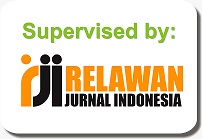BAHASA SEBAGAI ETIKA BERMEDIA SOSIAL (KATA “ANJAY” DAN KONTROVERSINYA)
Abstract
Keywords
Full Text:
PDF (Bahasa Indonesia)References
Chaer, A & Agustina, L. 2014. Sosiolinguistik Perkenalan Awal. Jakarta: PT Rineka Cipta
Moleong, L.J. 2007. Metodologi Penelitian Kualitatif. Bandung:Remaja Rosdakarya.
Muliawati, H. 2017. Variasi Bahasa Gaul pada Mahasiswa Unswagati Prodi Pendidikan Bahasa dan Sastra Indonesia Tahun 2016. Dieksis: Jurnal Pendidikan Bahasa dan Satra Indonesia. Vol. 4, No. 2. doi: 10.33603/dieksis.v4i2.618.
Sulaeman, A & Dwihudhana, W. 2019. Hubungan Motivasi Belajar terhadap Hasil Pembelajaran Bahasa Indonesia bagi Penutur Asing (BIPA) pada Mahasiswa Semester 7 Program Studi Pendidikan Bahasa dan Sastra Indonesia FKIP Universitas Muhammadiyah Tangerang. Silampari Bisa: Jurnal Penelitian Pendidikan Bahasa Daerah dan Asing, Vol. 2, No. 1. doi: 10.31540/silamparibisa.v2i1.327.
Adilla, N. 2009. Pengaruh Kontrol Sosial Terhadap Perilaku Bullying Pelajar di Sekolah Menengah Pertama. Jurnal Kriminologi Indonesia, Vol. 5, No. 1. https://lib.ui.ac.id/abstrakpdf.jspdetail?id=20334443&lokasi=lokal.
Goziyah & Maulana, Y. 2019. Bahasa Gaul (Prokem) Generasi Millenial dalam Media Sosial. Prosiding Seminar Nasional Bulan Bahasa (Semiba) 2019. https://researchgate.net/publication/3339209574.
Kaplan, A.M & Haenlein, M. 2010. Users of the World, Unite! The Challenges and Opportunities of Social Media. Business Horizons, Vol. 53, Issues. 1. https://www.sciencedirect.com/science/article/abs/pii/S0007681309001232
Pembayun, G.J. 2017. Rekonstruksi Pemikiran Habermas di Era Digital. Jurnal Komunikasi dan Kajian Media, Vol. 1, No. 1. https://jurnal.untidar.ac.id/index.php/komunikasi/article/view/381.
Prasetyo, A.G. 2012. Menuju Demokrasi Rasional: Melacak Pemikiran Jurgen Habermas tentang Ruang Publik. Jurnal Ilmu Sosial dan Ilmu Politik, Vol. 16, No. 2. https://jurnal.ugm.ac.id/jsp/article/view/10901.
Yana, A. dkk. 2018. Kosakata Bahasa Gaul Siswa Sekolah Dasar Kelas Tinggi. Jurnal Handayani, Vol. 9, No. 1. https://jurnal.unimed.ac.id/2012/index.php/handayani/article/view/10507.
Asosiasi Penyelenggara Jaringan Internet Indonesia. 2020. Laporan Survei APJII 2019-2020. https://apjii.or.id .
Sidik, F.M. 2020. Komnas PA: 'Anjay' Kata Kasar, Anak Bisa Diadukan karena Kekerasan Verbal. https://news.detik.com/berita/d-5151286/komnas-pa-anjay-kata-kasar-anak-bisa-diadukan-karena-kekerasan-verbal
DOI: https://doi.org/10.32528/mdk.v4i2.5855
Copyright (c) 2021 MEDIAKOM

This work is licensed under a Creative Commons Attribution-NonCommercial-ShareAlike 4.0 International License.








